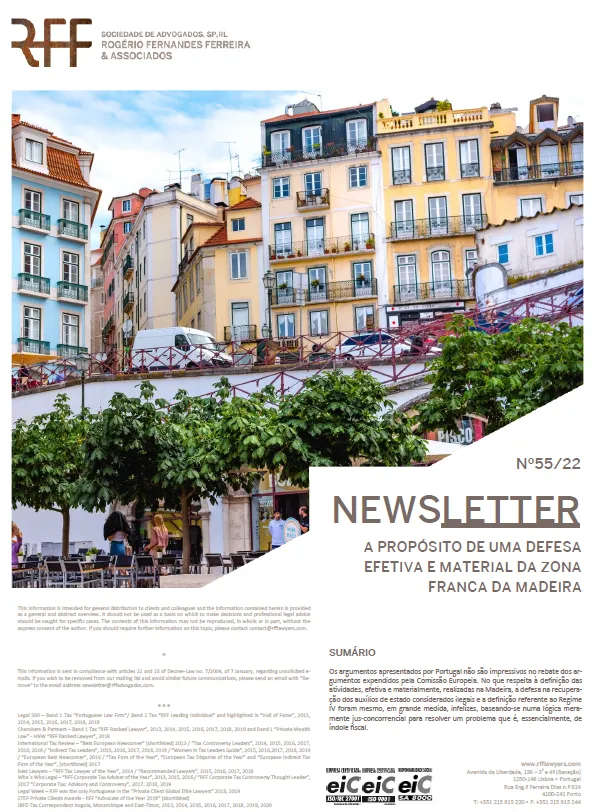In view of a material and proper defense of the Madeira Free Trade Zone

In view of a material and proper defense of the Madeira Free Trade Zone
The Madeira’s International Business Center (Madeira’s IBC), within the framework of the Madeira Free Trade Zone (Madeira’s FTZ), embodies a set of incentives, namely of tax nature. It stands out for the diversity of the activities which may be developed within its scope, covering industrial, commercial, maritime and service operations. Madeira’s IBC takes advantage of the qualities of Portugal as a solid investment platform in the European context, namely in the current geostrategic context, where security and location are key to any investment.
In 2020, the European Commission communicated the final Decision on the formal investigation on the Regime III of Madeira’s FTZ, concluding that the said regime III constitutes state aid abusively applied by Portugal, alleging the violation of the European rules on the said matter. The Decision of the European Commission is grounded, essentially, both in relation to the accounting of the number of jobs where the adopted methodology was deemed inconsistent, since situations of part-time jobs were being counted as if corresponding to a (full) job unit, where the European Commission’s view is of said only being counted in proportion to the hours worked. Additionally, the European Commission concluded that they should only have been applied in relation to activities “effectively and materially” carried out in the Madeira Region.
Regarding the Appeal brought by the Portuguese State against the Decision of the European Commission, the General Court of the European Union has validated the position of the European Commission on the interpretation of "activities effectively and materially carried out in Madeira", stating that such expression cannot be interpreted as referring to activities carried out outside of such Autonomous Region, even if by companies registered in Madeira’s FTZ.
However, the arguments put forward by Portugal were not impressive in rebutting the arguments of the European Commission on the Appeal filed by Portugal to the European Court of Justice. Regarding the definition of the activities actually and materially carried out in Madeira, the defense of the recovery of the state aid deemed illegal and the definition relating to Regime IV were to a large extent unfortunate, being based on a purely legal and competition logic to solve a problem that is essentially of tax nature, since the question of note is whether such activities are effectively, or not, subject to taxation in Madeira (as, otherwise, the question of the tax benefit granted by Portugal would not arise).
In this sense, the "concept" should be densified - which has not happened yet - according to the rules and principles related to income allocation, under the international tax law and transfer pricing rules. Under this light, the place of physical presence of the employees is only one of the relevant data for the allocation, and not necessarily the decisive one.
Therefore, it is important to note that the economic agents shall defend themselves, using the resources at their disposal, including the possibility of filing an Appeal against the Decision of the European Commission to the General Court of the European Union, on different grounds, even if complementary to those previously presented by Portugal. It is equally important that, in view of a proper and material defense of Madeira’s FTZ, the Portuguese State lodges an Appeal of the Decision of the General Court to the Court of Justice of the European Union.
In face of the above, we are at a crucial moment to state that the singularities of the Portuguese tax system and of the Madeira’s FTZ regime remain relevant to Madeira and to our Country and, in compliance with the European state aid rules, its maintenance and improvement has effective and real justification, as in other cases like other European tax incentive regimes where these issues have not yet been admitted by the European Commission.
***
Lisbon, 17th November 2022
Rogério M. Fernandes Ferreira
Marta Machado de Almeida
Álvaro Silveira de Meneses
Miriam Campos Dionísio
João Freitas Jacob
(Tax Advisory Team)
